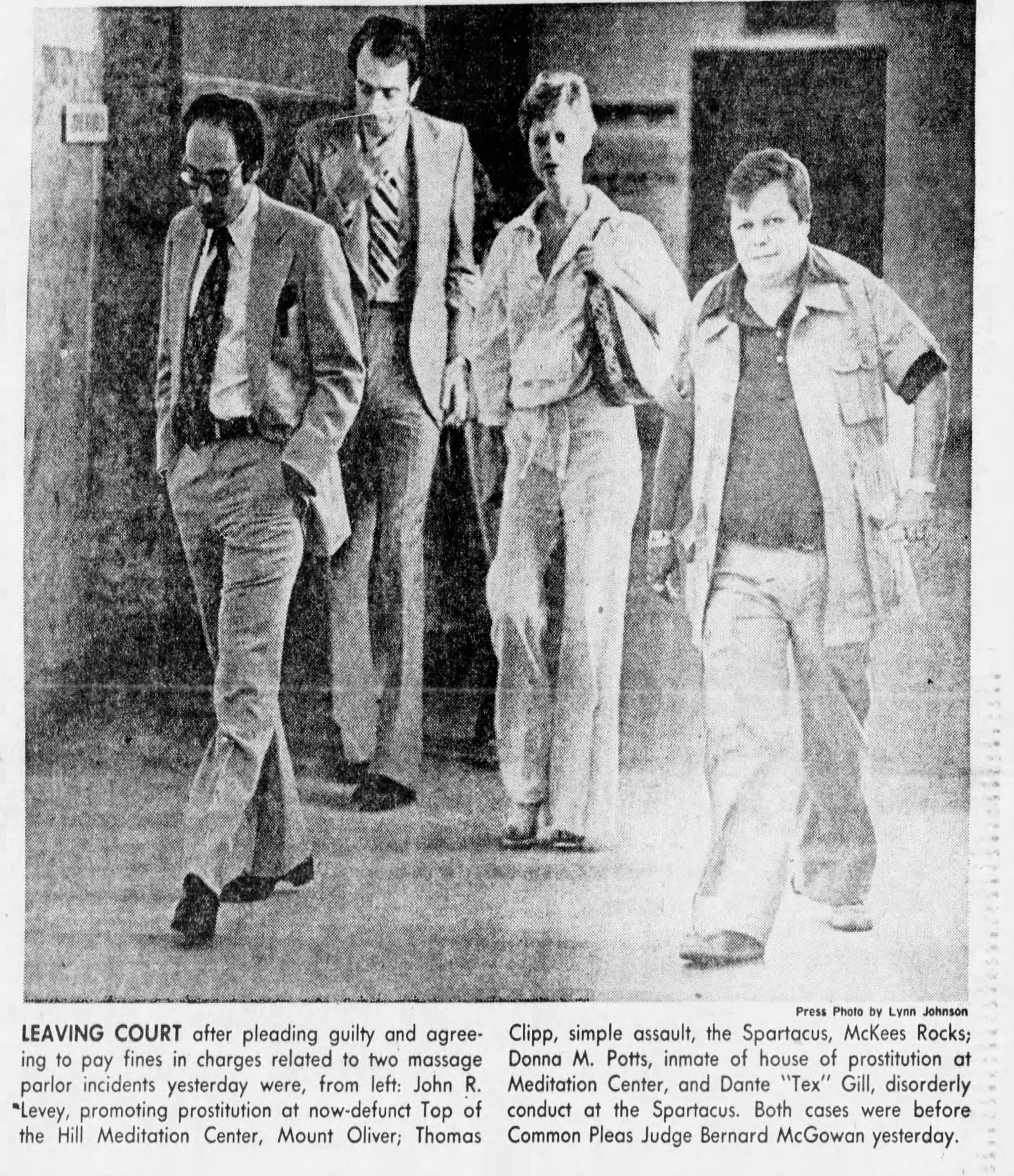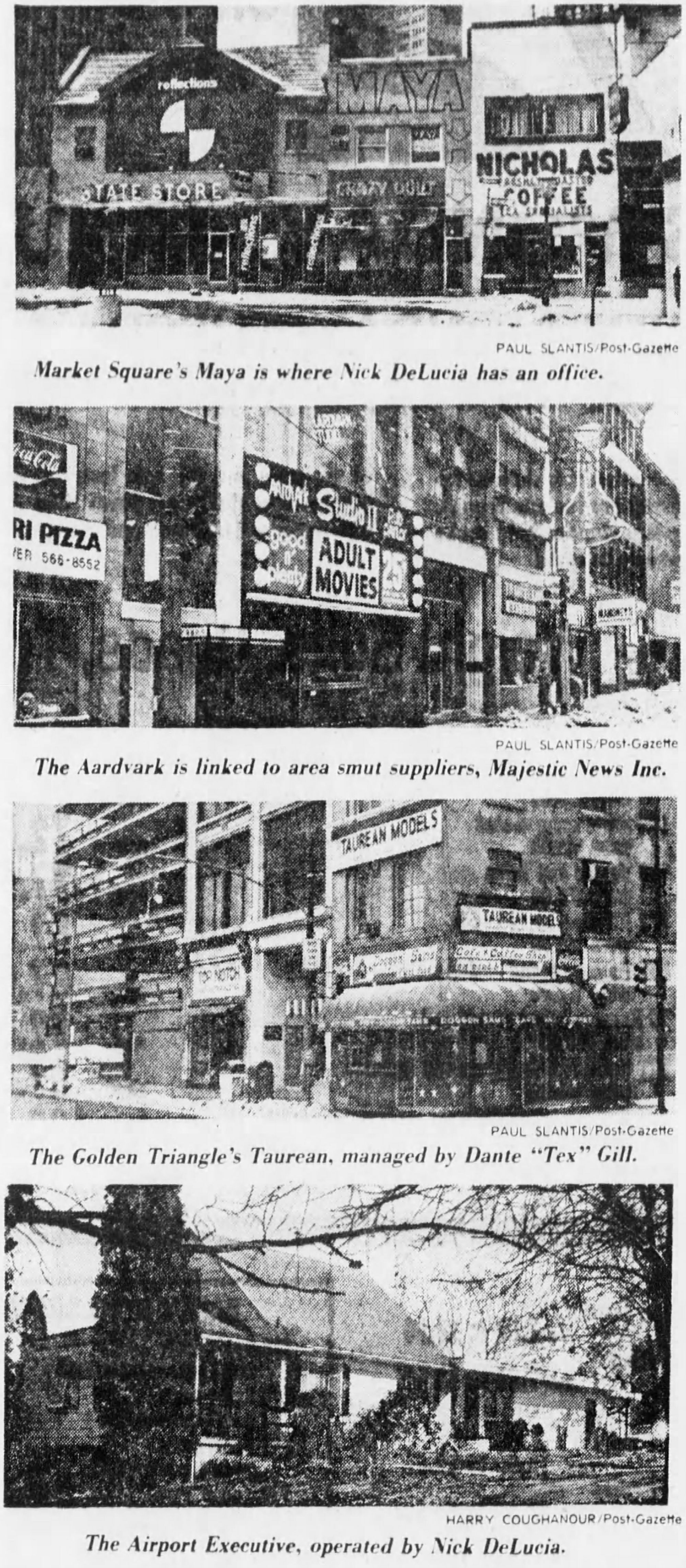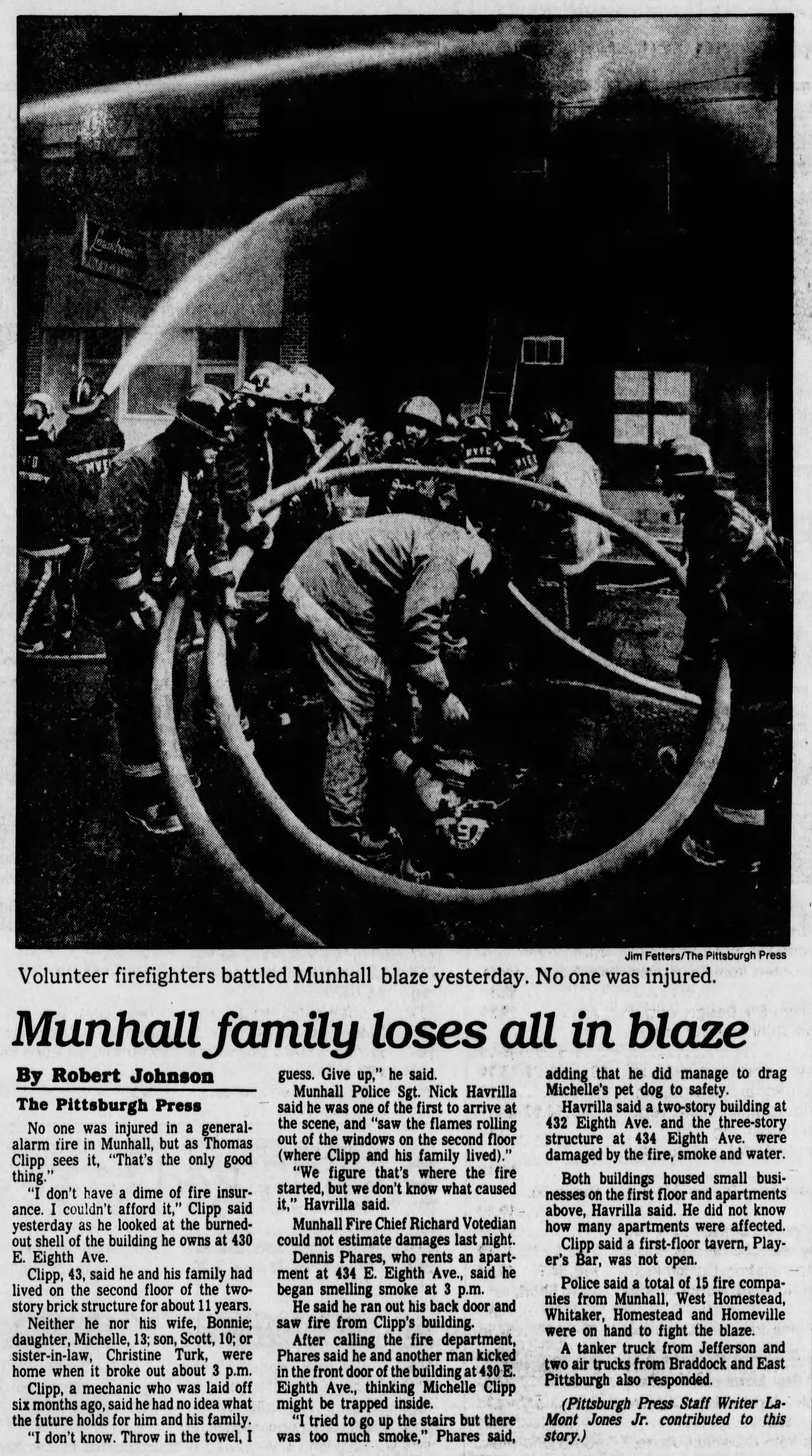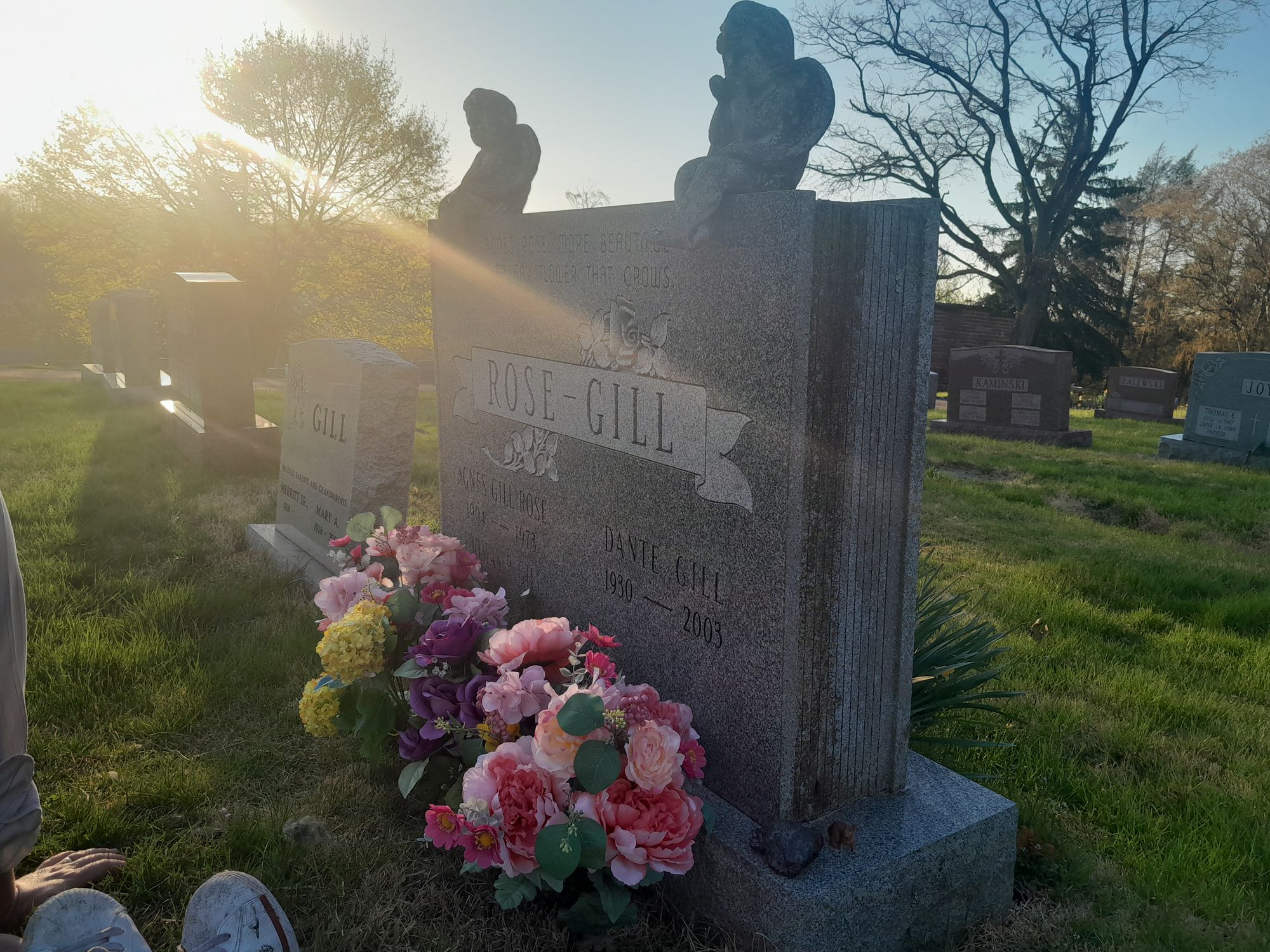Rub 'n Shrug: on Dante "Tex" Gill
Transness is queer, queer people are straight, men are women, whatever.

On a cold night in the winter of 1982, two young dykes walked in late to Players 430, the short-lived lesbian bar on East Eighth Avenue in Munhall, where they found the usual crowd pressed against the bar, watching Dante “Tex” Gill move under the lights on the dance floor, easy in a sharp three-piece suit despite their stares. Tex was unwelcome, he knew it, and he didn’t seem to care.
Two beautiful women in dresses and two big men danced alongside him. Violet, who was one of the dykes running late that night, believes that the women were likely sex workers at one of the massage parlors Gill operated, and the men likely bouncers or security guards at the same venues. Gill lifted up the women’s skirts as they twirled, laughing. “I don’t know what they were flying on,” Violet tells me, “but everyone in that group was high, and not from alcohol.”
Walking by the dance floor, one of Violet’s friends got smart. “Who does she think she’s fooling?” the friend said loudly, indicating Gill. Swiftly, as Violet tells it, older lesbians clapped hands over the friend’s mouth, shushing urgently and pulling her and Violet away from the dance floor and into the crush of people. Much as I’d like to imagine otherwise, the older butches’ protectiveness was no show of solidarity with Gill, nor some kind of early detente in the nascent butch/FTM border wars. Rather, Tex was a gangster, and people were afraid of him.[1] He was also trans, a fact well-known at the time,[2] but better tolerated in the straight world than in lesbian spaces.
Although Tex did meet his then-wife Cynthia Bruno-Gill at Shawn’s, an older lesbian bar on Fifth Avenue in the Hill District, in my research I found scant evidence of his presence at Pittsburgh lesbian-feminist venues like the Wildsisters coffee house–later the restaurant Bloomers–on 27th Street on the South Side. Violet corroborated my findings, noting that because Tex was an unusual and notorious figure–not to mention a man–his rare presence in those venues was always remarkable. I found no evidence to suggest that Gill spent any significant time in the gay bars which catered to men.[3]
The men’s spaces Tex frequented–the brothels and massage parlors he managed–were straight, part of a homosocial but not homosexual economic network connected to the Pittsburgh Mafia. Rather than scrutinizing Tex wrongly through the lens of an inaccurately lesbian history, as so often happens to historical figures we might today understand as transmasculine, I read Tex’s life as that of a straight man. Regardless of how Tex identified–which I don’t actually know and don’t care to speculate on[4]–he was a man with a wife.
I am interested in the remarkable fact that while Tex didn’t pass and his “sexually ambivalent” status was advertised in the newspapers, he operated in a world of men, none of whom besides himself are known to have been trans or queer, and that, for the most part, he was respected as a man by the people around him, and even sometimes by the press, largely for his willingness to engage in violence and extralegal commerce. According to some reports, Gill did sex work when he was young and still using his birth name, but in transition he became one of the men who facilitated sex work in Pittsburgh in the 1970s and 1980s, rather than one of the women who did the work. Another way to say this is that Gill’s life was organized around affinity, not identity. Like Torrey Peters and divorced women, but for Gill it was Italian-American gangsters from the Allegheny Valley who trafficked in other people’s desires and settled conflicts lethally.
Some of Gill’s infamy stemmed from his involvement in the infamous Pittsburgh “massage parlor wars” of the late 1970s, which began after kingpin George E. Lee, an interstate pornography distributor and owner of an extensive network of brothels and bordellos, was shot to death leaving an Italian restaurant at the corner of Wood and Seventh streets downtown in 1977. After Lee’s death, ownership of the massage parlors was split between Lee’s managers, retired city fireman-turned-mafioso Nick DeLucia Jr., and Dante “Tex” Gill. The two men soon found themselves in sustained and protracted competition. In the years that followed, an exploding package mailed to the DeLucia-operated Gemini spa downtown killed the sex worker who opened it; DeLucia put an unsuccessful hit out on Gill[5]; and one of Gill’s business associates was gunned down in an apartment in Scott Township which at the time was being rented by a woman who worked for Gill at the Spartacus in McKees Rocks. The Spartacus itself was the site of the 1978 sting during which Tex infamously hit a state trooper in the face with a birthday cake. Papers at the time reported that the cop’s undercover status was revealed when a savvy worker told him he’d have to touch her sexually before she’d do the same to him during the session he’d purchased. This same worker was the one who rented the apartment in which Gill’s associate, probably a bouncer, was later shot and killed.

The night Violet encountered him at Players 430, Tex had recently extricated himself from an ongoing public trial regarding that sting, and within a few short years he would be sent to prison[6] for tax evasion.[7] It’s also rumored that Tex spent the 1970s supplying “anabolic steroids” (now more commonly known as testosterone cypionate; who’s to say whether he injected any of it himself…) to the Pittsburgh Steelers while it was still legal,[8] though not exactly above board, for NFL players to use such performance-enhancing drugs. It was in this sort of gray economic zone that Gill operated best. He was notorious and he knew it, and by most accounts enjoyed his tough reputation.
The next time Violet spotted Gill was several years later at Bloomers, where Violet worked for a time as a server.[9] Gill was in the midst of his tax evasion trial, and was consulting with his lawyer, who was a lesbian. Bloomers would have provided a modicum of privacy for the two of them to talk away from public scrutiny, though still without anonymity. Despite the disdain Gill encountered in lesbian bars, and the violence that dogged him in the men’s world of organized crime, Gill continued until his imprisonment to participate in both social worlds. This fact leads me to believe that each fraught realm must also have been beneficial to him, or worth his time in some way. As I began to investigate what these benefits might be, I learned that Gill was actually a link between the massage parlors and the lesbian bars, and that he was part of the reason that the lesbian bar where Violet first spotted him was able to operate in the first place.
As Harrison Apple has written, all queer nightlife in Pittsburgh post-1960 was connected to Robert “Lucky” Johns, who operated the Travelers Club (T.C.) and House of Tilden among other gay after-hours clubs between 1960 and 1990. Many of Pittsburgh’s gay nightlife workers passed through Lucky’s clubs, learning the trade and acquiring connections, skills, and legitimacy; this emergent network became the Tavern Guild, and included, most prominently, Donald Thinnes, of the Norreh Social Club which he later renamed Donny’s; Chuck Honse and Chuck Tierney of The Holiday, New York New York (now 5801), and Images; Scott Noxon of Pegasus, the Eagle, and There; and Nancy Pribich, also known as Nancy Dyke, who worked for Lucky for many years while organizing the Steel City Softball League and then owned, first with Lucky and then as sole proprietor, the Real Luck Cafe. Less well-remembered is Joyce McIntyre, whose name I first heard from Violet. A little research revealed to me that McIntyre, who owned Players 430 for the entirety of its brief operation, and then ran Player’s Loft, a lesbian dance club above Zack’s 4th Avenue downtown, was also part of Lucky’s orbit. As Chuck Honse related to Apple, “Most of us worked for Lucky, he was the start of it, Donny at the TC and Tilden did, I did, Joyce McIntyre did - she owned ‘Players’ [Lesbian bar]out in Homestead, Nancy did [owner of ‘Lucky’s’ in the Strip], I think even Shawn [Shawn’s 1209, Lesbian bar] did - yeah I know Shawn did.”[10] And McIntyre, while not a major figure in this particular story, seems to have been a very colorful character in her own right. Here’s Lucky describing her to Apple:
[Y]ou heard of Joyce McIntyre? The one who started the women's bars? She's real prominent in the lesbians. Well I was there, letting people in, and this sailor come walking in. Ah, I love my naval people. [Laughs] So anyhow, he walk in and I try to make 'em and then they said "Ladies and Gentlemen, the winner of the costume contest is Joyce McIntyre! I said, Joyce?! Joyce?! Here it was her, she was a lesbian. I was a pluck woman. But that’s how we kept getting our money and keeping things open and paying for things Y’know?
The gay bars, Lucky is saying, could not be as exclusive as perhaps they would have liked or imagined themselves; they needed women to survive.[11] They also needed straight people; here’s Lucky again, explaining the level of control both legal and extralegal oversight exerted on the gay bars: “All our bars were owned by straight people, racketeers y’know. They would charge exorbitant prices, y’know, and in the bars, the liquor board, you were allowed to buy a drink but you weren’t allowed to move with it. You had to sit… right there!, [laughs] no dancing, no nothing, no. It was really trying time y’know.”
Violet had mentioned to me that Players 430 burned down after only a few years of operation, some time in the mid-1980s just as the steel mills started to close, putting workers, many of whom lived in Munhall and Homestead, out of a job. She suggested that the fire might have been arson, the newly unemployed workers taking out their frustration on dykes.
But just a little research illuminated another possibility. On June 13, 1986, the Pittsburgh Press ran an article about the fire with the headline “Munhall family loses all in blaze,” which reads like this: “No one was injured in a general alarm fire in Munhall, but as Thomas Clipp sees it, ‘That’s the only good thing [...] I don’t have a dime of fire insurance,’ Clip said yesterday as he looked at the burned-out shell of the building he owns at 430 E. Eighth Ave [...] Clipp, 43, said he and his family had lived on the second floor of the two-story brick structure for about 11 years.”
Clipp’s address is that of Players 430. According to the article, Clipp seems to have owned the building since at least 1975, more than five years before the bar opened. Reading the innocuous coverage of Clipp and his family, it took me a moment to remember why I recognized his name, or to make sense of why this ordinary straight man, identified farther down in the article as “a mechanic who was laid off six months ago,” might have had anything to do with a lesbian bar in the first place. Then it occurred to me: Clipp had been arrested alongside Tex Gill in 1978, following the sting at the Spartacus, for hitting the undercover state trooper in the head with a baseball bat. A quick search revealed that Clipp’s name appeared alongside Gill’s in the newspaper many more times; the earliest instance I found was on December 20, 1974. Gill, who at the time was still referred to in the paper by his legal name at birth, is recorded as having been arrested by the FBI and indicted, alongside four others, by a federal grand jury which “charged [that] the defendants conducted a prostitution business with links in the state of Indiana since 1962.” One of those defendants was Thomas Clipp, who at the time would have just been about to purchase a two-story brick building at 430 E. Eighth Avenue in Munhall.[12]

If the 1974 article reported correctly that Clipp and Gill had been working together since 1962, by the time his home burned down in 1986, Clipp had been working for or with Gill for more than half Clipp’s life.[13] In 1984, Clipp was tried alongside Gill for tax evasion,[14] but while Gill went to prison, Clipp was released due to a mistrial. So Clipp was a straight man who owned a Pittsburgh gay bar, and the gangster to whom he was closest was not some member of the Pittsburgh Mafia based in New Kensington,[15] but rather Dante “Tex” Gill. When Clipp was retried in 1986, Gill had been in prison in West Virginia for the last two years, during which time of course his protective powers over Clipp and Players 430 had waned. On May 21, 1986, the Pittsburgh Press reported that Clipp “pleaded guilty to federal income tax evasion.” Only twenty-three days later, Players 430 burned down.
I don’t have enough proof to state definitively that Gill’s imprisonment or Clipp’s conviction is what resulted in Players 430 burning down, or that the fire was arson, some late iteration of the massage parlor wars, but I’m saying it’s possible. And whether my speculations are correct or not, I do think that this interpretation opens up the possibility of viewing Gill differently as a historical figure, not as a failed or proximate lesbian but as a straight man with a straight man’s extralegal relationships to lesbian life in Pittsburgh; not as the embarrassment he was made out to be in a cruel obituary in the Post-Gazette which described his fatness with derision and his gender in willfully spectacular, inaccurate terms; nor as some mythic, gender-affirming paragon of tough-guy masculinity as was suggested in the protective and venerating articles that emerged about Gill in the queer press following Scarlett Johannsen’s brief and ill-advised plan to play him in a feature film in 2018. I want room for Gill to be a person, not just an idea, and to understand him not as a singular phenomenon but as part of a social network, someone with relationships and context who was more of a hustler than a queer elder or icon.
Here is what I know: Gill’s straightness was surely different from Clipp’s (who, to be fair, I don’t actually know to have been straight; just that, like Gill, he was a man with a wife), and lesbian bars obviously offered Gill some mode of safety. He was trans, maybe he was straight, he sought refuge in lesbian spaces even though they sometimes rejected him and in straight life even though he was in mortal danger there. Transness is queer, queer people are straight, men are women, whatever. Straight people are part of queer history; in gay life they’re called trade, the black squares on a Grindr grid who live straight lives while seeking to actualize their queer desires. In fact I know plenty of fags (sometimes I am plenty of fags) who would rather suck trade dick than fuck each other. How many dykes have broken their own hearts chasing straight girls who of course secretly wanted those dykes’ attention? I locate Gill somewhere in here, alongside the claim I’ve seen only in secondary sources that he got into crime to support his ailing mother, Agnes, who died in 1972. Without primary sources corroborating, I can’t say for sure, but it’s true both that Gill continued a life of crime for more than a decade after Agnes’ death, and also that he was buried, under his right name, beside her when he died in 2003.[16] What I’m saying is that I’m tired of assuming all trans men have lesbian pasts, and I’m tired of rejecting dyke history in order to prove I’m a fag. What I’m saying is that I’m personally invested in Gill for my own reasons, but that I don’t want to constrain him inside of my projections.

Footnotes
- Tex was rumored to be kind and generous to his employees as long as they were loyal to him. Whether this was kindness or coercion–the threat of retraction and retribution, or else obligation, underlying each gift–is impossible for me to say, and was likely far more nuanced than the dichotomy I’ve laid out here.
- In the newspapers, Tex was often referred to with he/him pronouns, and always by his chosen name, even if he was sometimes called “Ms. Gill” in those same articles. At his death in 2003 and during coverage of the ill-conceived and unrealized 2018 film project Rub & Tug in which Scarlett Johannson was set to play Gill, he was sometimes wrongly referred to as a “masculine woman” and a “woman who liked to dress like a man,” but a San Antonio Observer interview with Gill’s cousin, Pittsburgh Post-Gazette theater critic Barry Paris, cleared that up: “The pronoun needs to be ‘he’ and ‘him’ rather than ‘she’ and ‘her,’ even though the newspapers refused to do it when he was alive,” Paris said. “He totally identified as a man from the time my cousins and I first knew him. He was always overtly masculine. … He hated to be called ‘she,’ and that’s what the police always did, and the papers. It annoyed and upset him.” (Wonderfully, Paris also notes that in the 1950s, when Gill was teaching riding at the horse stables in Schenley Park, he was living in a trailer near the stables with “a beautiful blonde [...] Everyone was fascinated and slightly scandalized by it, but that’s the way Tex was.” https://www.mysanantonio.com/entertainment/article/Dante-Tex-Gill-s-Cousin-Tells-Us-What-Tex-13071088.php
- Violet tells me that the first time she heard the word “trans” was at the 1984 Michigan Women’s Music Festival. I mention this because I interviewed Violet just as the new round of anti-trans legislation was being discussed in the news and Violet, a sixty-something lesbian, was the only non-trans person in my life to ask me how I was feeling about the legislation, if I was scared. Without my prompting, Violet volunteered that she regretted looking skeptically at people she now understood to have been trans women when she encountered them in lesbian spaces prior to the summer of 1984 when she came to understand how she had been misreading and misunderstanding these women, that she felt embarrassed and sad for having tried to defend lesbian spaces from them, and that she felt relieved at having had the opportunity to change.
- It does matter to me not to impose my reading of who Tex was, which is always an overreach for people I don’t know, and usually for those I do as well, much as my ego would like to think otherwise.
- https://www.newspapers.com/article/the-pittsburgh-press/18881271/
- At Alderson, the Federal Prison Camp on the border of Summers and Monroe Counties in southern West Virginia. FPC Alderson, the first prison in the US established specifically (and ostensibly) for women, gained the nickname “Camp Cupcake” when Martha Stewart served time there for insider trading in the early 2000s. Some friends of mine run Alderson Hospitality House, a free bed and breakfast which provides temporary room and board to the loved ones of people incarcerated there, so that visits to the rural area are affordable and materially possible. You can donate to their work here: https://aldersonhospitalityhouse.org/
- In December of 1984, the Pittsburgh Press gave Dante Gill “the IRS 1040 Award for Fiction. According to income tax evasion trial testimony, two of Mr. Gill’s parlors may have earned $757,900 in a given year, which is about $500,000 more than Tex reported to the Internal Revenue Service.”
- Many, many secondary sources repeat this marvelous fact, though I have yet to find primary evidence of it. If any readers have the material to confirm my hopeful fantasies, please get in touch.
- Violet is the friend of a friend; she generously agreed to share with me her experiences in Pittsburgh’s lesbian bars in the 1980s, and her impressions of Dante “Tex” Gill, the figure of my interest. Naively, I had assumed that because Violet and Gill were in the same small scene, the two were friends, or at least acquainted. Instead, Gill was as much a figure, an idea really more than a person, to Violet, as he was to me. Several times during our conversation Violet apologized to me for not having more to share, but I loved what she had to say. What she knew was not Tex Gill’s intimate life, but rather what he meant to people. This meaning too is history.
- This and all further quotes from interviews conducted by Harrison Apple come from their 2021 dissertation “A Social Member in Good Standing: Pittsburgh’s Gay After-Hours Social Clubs, 1960-1990.” https://repository.arizona.edu/handle/10150/658600
- In addition to the bars and after-hours clubs, Pittsburgh’s adult bookstores and porn cinemas catered to both gays and lesbians throughout the 1970s. In the September 1977 issue of Gay Life magazine, society columnist and publisher Brian Michaels reported “[a]ppearing at the Penthouse (the female side of CFC [the Cinema Follies Club, which opened in June 1977 with a wine and cheese party followed by a screening of Tim Kincaid’s 1976 trucker porn feature film The Kansas City Trucking Co.]) last month was Toni Dawn, a lesbian stripper who has become a frequent feature dancer there. Toni is traveling with her lover, ‘Honey Storm,’ and has come to love yuns in Picksberg. She hopes to return soon for her final appearance before retiring to set up housekeeping in Kentucky with Honey, and extends an invitation to Pittsburgh women to come see her. Another lesbian stripper and Pittsburgh native appearing regularly is Shawna, formerly of the Home Circle [a gay bar which frequently hosted DIY theater and other performances]. Watch for Shawna’s return!”
- More research also brought me to a Post-Gazette article from the day of the blaze which noted that “The fire began in an apartment in the rear of the 430 Club, a private club at 430 E. Eighth Avenue.”
- In 1962, Clipp would have been about twenty-three, and Gill thirty-eight. These ages however are approximate; the 1974 article identifies Clipp as 35, but twelve years later, in 1986, he is reported to be 43.
- At the time of the 1984 trial, the Pittsburgh Press reported that Clipp was working the front desk of Gill’s Roman V massage parlor downtown.
- https://www.newspapers.com/article/18881245/the-pittsburgh-press/
- While driving through Saint Augustine Cemetery in Shaler Township, looking for Gill’s grave, I turned a corner and saw another name I recognized: Walter Thinnes, father of Donald Thinnes, aka Donny of Donny’s. Pittsburgh stays a one-degree town.